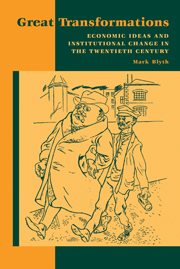8 - Conclusions
Published online by Cambridge University Press: 05 June 2012
Summary
The “end of ideology” is never possible: no social order is given once and for all.
– Adam Przeworski, Capitalism and Social Democracy (Cambridge: Cambridge University Press, 1985), p. 146.The aim of this book has been to demonstrate that large-scale institutional change cannot be understood from class alignments, materially given coalitions, or other structural prerequisites. Instead, it has been argued that institutional change only makes sense by reference to the ideas that inform agents' responses to moments of uncertainty and crisis. This is not to claim structures irrelevant; far from it. But it is to claim that the fact of structural change does not on its own create a particular politics. Regardless of the structurally given interests one assumes agents to have, such structures do not come with an instruction sheet. This conclusion strengthens these claims in four ways.
First, this chapter revisits the five hypotheses about ideas posited in Chapter 2. These hypotheses, and the more general claim that institutional change follows a particular sequence, are reexamined. Where appropriate, counterfactual logics are used to support the claims made. Second, this chapter discusses the relevance of this study for existing theories of institutional change. In particular, likely objections to the theory presented here and the limits of such ideational explanations are explored. Next, we consider whether the second great transformation was as great as the first, or indeed, whether these institutional changes constitute a simple return to the market-conforming institutions of the 1920s.
- Type
- Chapter
- Information
- Great TransformationsEconomic Ideas and Institutional Change in the Twentieth Century, pp. 251 - 276Publisher: Cambridge University PressPrint publication year: 2002
- 1
- Cited by



